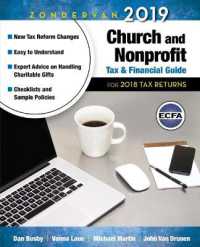Full Description
Building on work in feminist studies, queer studies and critical race theory, this volume challenges the universality of propositions about human nature, by questioning the boundaries between predominant neurotypes and 'others', including dyslexics, autistics and ADHDers.
This is the first work of its kind to bring cutting-edge research across disciplines to the concept of neurodiversity. It offers in-depth explorations of the themes of cure/prevention/eugenics; neurodivergent wellbeing; cross-neurotype communication; neurodiversity at work; and challenging brain-bound cognition. It analyses the role of neuro-normativity in theorising agency, and a proposal for a new alliance between the Hearing Voices Movement and neurodiversity. In doing so, we contribute to a cultural imperative to redefine what it means to be human. To this end, we propose a new field of enquiry that finds ways to support the inclusion of neurodivergent perspectives in knowledge production, and which questions the theoretical and mythological assumptions that produce the idea of the neurotypical.
Working at the crossroads between sociology, critical psychology, medical humanities, critical disability studies, and critical autism studies, and sharing theoretical ground with critical race studies and critical queer studies, the proposed new field - neurodiversity studies - will be of interest to people working in all these areas.
Chapter 7 of this book is freely available as a downloadable Open Access PDF at http://www.taylorfrancis.com under a Creative Commons Attribution-Non Commercial-No Derivatives (CC-BY-NC-ND) 4.0 license.
Contents
Introduction
Curing Neurodivergence/Eugenics
1. The Production of the 'Normal' Child: Neurodiversity and the Commodification of Parenting
2. Language Games Used to Construct Pathological Autism
3. Is There an Ethical Case for the Prevention and/or Cure of Autism?
Neurodivergent Wellbeing
4. Neurodiversity, Disability, Wellbeing
5. Neurodiversity in a Neurotypical World: An Enactive Framework for Investigating Autism and Social Institutions
Cross-Neurotype Communication
6. Neurodiversity and Cross-Cultural Communication
7. Understanding Empathy Through a Study of Autistic Life Writing: On the Importance of Neurodiverse Morality
8. Sensory Strangers: Travels in Normate Sensory Worlds
Neurodiversity at Work
9. Practical Scholarship: Optimising Beneficial Research Collaborations Between Autistic Scholars, Professional Services Staff and 'Typical Academics' in UK Universities
10. Designing an Autistic Space for Research: Exploring the Impact of Context, Space, and Sociality in Autistic Writing Processes
11. How Individuals and Institutions Can Learn to Make Room for Human Cognitive Diversity: A Personal Perspective from My Life in Neuroscience
Challenging Brain-Bound Cognition
12. Understanding Autistic Individuals: Cognitive Diversity not Theoretical Deficit
Moving Forwards
13. Neuronormativity in Theorising Agency: An Argument for a Critical Neurodiversity Approach
14. Defining Neurodiversity for Research and Practice
15. A New Alliance? The Hearing Voices Movement and Neurodiversity
Conclusion







